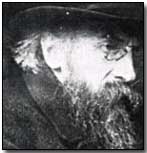Feature Articles - Munich
Back To Bavaria
Apart from Eisner's handing the Allies state secrets, Bavaria had been very much on the sidelines of national affairs, which suited many, including the local SPD men, who were now in control of the state after a resounding victory in the Bavarian Landtag elections on 12 January.
The SPD returned 1,124,000 votes as opposed to Eisner and his USDP clique's 86,000. Another party that did well was the centralist Bayerische Volkspartei (BVP) - they had run a campaign tapping into Catholic fears of Eisner as a Soviet stooge.
His position now untenable, Eisner clung on to power for a few more weeks until it became apparent, even to an idealist like him, that there was no choice left but to resign. The day he chose to deliver his resignation, 21 February, also happened to be the last of his life.
Count Anton Arco auf Valley, the man who gunned Eisner down, had been a student at the University at Munich and was linked to a shadowy organisation called the Thule Society. This far-right group was a collective of influential persons obsessed with the völkish movement, German mythology and, most importantly, racial purity in society.
The Thule Society's sister organisations was the Schutz und Trutz Bund (League for Protection and Resistance). The symbol they chose to reflect their Aryan credentials was the Hakenkreuz - the Swastika (a symbol that had also been adopted by a number of Freikorps units). Unsurprisingly, they loathed Eisner, and many Thule Society members openly called for his assassination.
Arco's application had been rejected because his mother was of Jewish descent. Seething with shame and rage he decided to perform a task to prove his mettle to the Thule Society. And so Eisner's death was not brought about by a well planned conspiracy, but from the desperation of a young man indoctrinated by the anti-Semitism and class hatred.
As a postscript, Arco was convicted of murder, but released in 1924 on the grounds of 'ill health'. He was to die ignominiously just after the Second World War when an American jeep ran him over in an auto-accident.
Helter Skelter
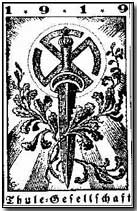 With hindsight it is clear that Eisner's death was the result of Arco's actions
alone; at the time, however, most in the working classes believed the
assassination was a right wing conspiracy. They also believed that it was
an assassination implemented with a nod and a wink from the SPD (had not events
in Berlin proven where their real loyalties lay?).
With hindsight it is clear that Eisner's death was the result of Arco's actions
alone; at the time, however, most in the working classes believed the
assassination was a right wing conspiracy. They also believed that it was
an assassination implemented with a nod and a wink from the SPD (had not events
in Berlin proven where their real loyalties lay?).
One young man, an apprentice butcher named Alois Linder, was quick to come to this conclusion and decided to take immediate revenge against the SPD.
Within an hour of assassination, the Landtag sat in stunned silence listening to Eisner's nemesis Erhard Auer delivering a eulogy for the dead Prime Minister. He had just finished when the unnoticed Linder walked calmly into the assembly, down one of the aisles and up to a banister. He then drew a Browning rifle, steadied himself on the railing and blasted Auer from his chair.
Auer, although not dead, was seriously wounded. In the meantime, Linder calmly strolled back up the aisle, took a few pot shots at the BVP benches and then approached the exit. As he did so a brave officer, Major von Jahreiss attempted to halt him. Linder killed him with a single shot and walked out to be lost in the swirling crowds.
Unlike Arco, Linder was not acting alone. A second gunman opened fire from the visitor's galleries, aiming again at the BVP - this time the party's leader took a fatal bullet to the head. Linder fled to Austria, was extradited and served 14 years for murder. Auer was taken to hospital and was operated on by the same surgeon who had moments before saved Arco. Later on Auer sent Arco a bunch of red roses. So much for eulogies.
Saint Eisner
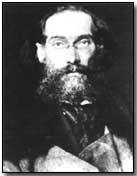 Church bells across the city now tolled for the dead Prime Minister (the bell
ringers in some cases being forced to perform their task under the wrathful eyes
of the 'Security' forces).
Church bells across the city now tolled for the dead Prime Minister (the bell
ringers in some cases being forced to perform their task under the wrathful eyes
of the 'Security' forces).
The assassination spot was quickly covered in floral tributes and red flags. Framed portraits of Eisner were set up in the streets and those who passed were forced to remove their hats by security patrols.
Members of the Thule society managed to desecrate the 'shrine' by soaking sacks of flour with the scent of bitches on heat, which they then dumped over the site: street dogs soon gathered and fouled the area.
Eisner's funeral took place on 26 February and a day of mourning was declared throughout Bavaria. Thousands upon thousands of workers, peasants, the intelligencia and the curious attended the funeral. Civic leaders and members from the Landtag were also present.
In the crowds a number of protest banners were held aloft, many carried the words: "Vengeance for Eisner!" Eulogies were delivered, including one from Gustav Landauer who compared the dead Prime Minister to Goethe, Jan Hus, a number of Old Testament prophets and, for good measure, Jesus.
In the fall-out of Eisner's funeral, a new government was hobbled together and called the Zentralrat (Central Council), while the Landtag was temporarily dissolved. The SPD demanded, as the winner of the largest vote in the elections, to take the dominant role.
As Auer was still convalescing, the man at the helm of the SPD, and now the Zentralrat, was now Johannes Hoffmann.
SPD Ousted
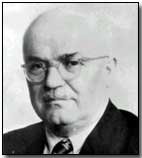 Hoffmann came under immediate pressure from all sides. He needed the
assistance of the national government in order to gain economic support - Eisner's
'print more money' policies without national government support had shown how
damaging the pursuit of an isolationist line could be economically.
Hoffmann came under immediate pressure from all sides. He needed the
assistance of the national government in order to gain economic support - Eisner's
'print more money' policies without national government support had shown how
damaging the pursuit of an isolationist line could be economically.
Unfortunately for Hoffmann, a draft constitution for the Weimar Republic had just been announced and under its framework Bavaria was to lose its reserve rights. BVP members were so angered that many in the party openly called for Bavarian succession. Local SPD big-wigs were also upset.
On 22 March news arrived that Budapest had been taken over by Communist forces and had established a soviet. The news worried Hoffmann, who had seen that Communist forces were gaining strength in Munich and they were led by a powerful new triumvirate known as the "Russians" (this was because of their family connections to Russia), Towia Axelrod, Max Levien and Eugen Leviné.
Hoffmann decided to curtail their increasing power and announced the Landtag would reconvene on 8 April, earlier than had been agreed. Knowing the anger this would create within radical circles, Hoffmann went to Berlin to garner support from the national government, although his refusal to give up Bavaria's reserved rights led to his being cold-shouldered.
On 5 April Munich's politicians, with Hoffmann in Berlin, met to thrash out the next moves of the revolution. At the meeting Leviné demanded the creation of a soviet. Rather than saying yes or no, and without their leader, the SPD delegates adjourned the meeting to make a decision 48 hours later.
The radicals made the decision for them: their supporters came out in droves yelling the classic cry "All power to the Soviets!" On 6 April the new Soviet Republic of Bavaria was proclaimed. The SPD leaders, realising that staying in Munich was becoming too dangerous, left for Nuremburg, and from there to Bamberg where a small Freikorps detachment protected them.
Coffee House Republic
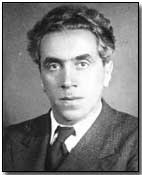 The far left of the Zentralrat met to form a new cabinet for the new country.
The Independent Socialists - the main leaders being
Ernst Toller and Erich Mühsam
and Gustav Landauer - took over the reins of power (their stock was at an all
time high due to their close association with Eisner).
The far left of the Zentralrat met to form a new cabinet for the new country.
The Independent Socialists - the main leaders being
Ernst Toller and Erich Mühsam
and Gustav Landauer - took over the reins of power (their stock was at an all
time high due to their close association with Eisner).
The new regime was instantly criticised by the Communists for pandering to the old regime and for failing to set up a true soviet. It did not bode well for the coffee house intellectuals.
If Eisner seemed eccentric then these men veered towards being mentally unhinged. Indeed, the new Foreign Minister, Dr Lipp (whom Toller had brought along to the meeting and seconded) was straight from an asylum!
With a vast unkempt beard Lipp would decorate his offices with bundles of red carnations. He also had a penchant for firing off bizarre telegrams to important people. To Lenin he complained that Hoffmann had run off with the keys to the ministerial toilet. He also added details about Noske having the hands of a gorilla, which dripped blood.
Lenin did not reply, so Lipp had the same telegram sent off to his 'good friend' the Pope.
Lipp then announced to his astounded colleagues: "I have declared war on Württemberg and Switzerland, because these dogs have not at once loaned me sixty locomotives. I am certain that we will be victorious. Furthermore, I will ask the Pope, with whom I am well acquainted, to grant his blessing for this victory."
Even for the coffee house radicals was too much; Lipp was soon sent back to the asylum, but the bizarre decrees kept on coming. Banks and large centres of industry were nationalised. The Commissar for Finance was also of the opinion that money should be free.
The Commissar of Public Instruction declared that the University of Munich was now open to anyone wishing to enrol and all courses were to be free. The history department was suppressed as the subject was 'the enemy of civilisation'.
Enter The Communists
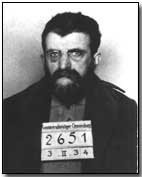 On 12 April the Republican Guards, a right wing militia in the pay of Hoffmann,
mutinied against Toller's rule. They seized the Landtag, other major
government buildings and arrested Erich Mühsam and Dr Lipp. Toller was
quick to react - he rallied his Red Guard militia. With numerical
superiority and Toller personally leading them into battle, they swiftly
defeated their opponents.
On 12 April the Republican Guards, a right wing militia in the pay of Hoffmann,
mutinied against Toller's rule. They seized the Landtag, other major
government buildings and arrested Erich Mühsam and Dr Lipp. Toller was
quick to react - he rallied his Red Guard militia. With numerical
superiority and Toller personally leading them into battle, they swiftly
defeated their opponents.
Unfortunately for Toller the workers and Red Guards decided his and his colleagues services were no longer required. After being arrested, freed, re-arrested and freed again, the Communists eventually decided to give Toller a say in the of organising Munich's defences.
The Communists secured power, with the "Russians", Towia Axelrod, Max Levien and Eugen Leviné, at the helm. It is worth noting that all three were of Jewish backgrounds, something that the far right pounced on and never tired of emphasising.
Of the three, Levien was probably the most radical and the most dominant. He had become a Spartacist during the war and, after being conscripted, lectured soldiers on the need for an Allied victory. "It is necessary," he said, "that Germany be humiliated, that the colonial troops of France and England march through the Brandenburg Gate."
Red Army Rises
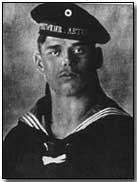 In charge of the Communists' defence force was Rudolf Egelhofer, a 26-year-old
ex-sailor who had taken part in the Kiel Mutiny.
In charge of the Communists' defence force was Rudolf Egelhofer, a 26-year-old
ex-sailor who had taken part in the Kiel Mutiny.
Egelhofer immediately set about bolstering the numbers by offering free food and, on the face of it, good money: privates were paid 25 marks a day and NCOs 130 marks and officers 500 marks. Prostitutes, it is said, were also 'supplied'.
To pay for this new army, the Communists simply printed off more notes. Indeed, the finance minister was forced to keep the presses running day and night just to keep up with the rate of inflation.
Weaponry was a problem as the considerable arsenals that had been stockpiled in Munich were now bare. Egelhofer threatened to have anyone holding on to weaponry shot unless they handed their firearms over. Despite the threats there was still a shortage: 12,000 rifles were distributed to an army that now numbered 20,000 men.
The clampdown on 'reactionaries' began almost immediately. One person the Communists deemed worthy of arrest was Adolf Hitler, now a well known nationalist who had just returned from a stint as a prison guard of a Russian P.O.W camp at Traunstien.
On 27 April, according to Hitler's memoirs, three men arrived at his barracks to arrest him. "Faced with my levelled carbine," said Hitler, "the three scoundrels lacked the necessary courage and marched off as they had come."
Bavaria's Loss Is Germany's Gain
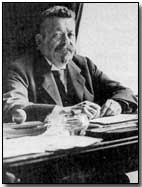 Back in Bamberg, Hoffman had been busy. Because of Eisner's pacifist
policies, Bavaria lacked the Freikorps units needed to smash the Communists.
Back in Bamberg, Hoffman had been busy. Because of Eisner's pacifist
policies, Bavaria lacked the Freikorps units needed to smash the Communists.
Outside of the state, however, the number of Freikorps had mushroomed in numbers - over 400,000 men were estimated to have joined, or were affiliated with, the Freikorps by spring 1919. Hoffman asked the national government for help in ridding Bavaria of the Communists.
In return for their support, Hoffman was told - again - that Bavaria would have to relinquish the reserved rights.
Unwilling, or unable, to accept Ebert's terms, Hoffman decided to raise his own counter-revolutionary army. Hastily arranged and poorly supplied, Hoffman's small force reached Dachau, about 25 miles north of Munich on 20 April. This force clashed with a Red Army detachment of around 7,000 men led by Toller.
After a brief skirmish, the outnumbered SPD forces cracked and fled. The Red Army netted five enemy officers and 36 troops. Egelhofer ordered Toller to shoot them, although Toller refused.
With his forces smashed, Hoffman travelled to Weimar to beg for help. Noske laid down the ground rules for a third and final time - Bavaria was to drop its reserved rights. The operation to retake Munich was to be under the sole control of General von Oven - and he took his orders directly from Noske. Von Oven was to return control of Munich to Hoffman once the Red opposition had been crushed.
The Communists were well aware that Hoffman would scurry off to the national government looking for help. They were also well aware of the kind of threat the Freikorps posed. The Red Army was put on high alert and Munich's defences strengthened.
Supplies, however, were becoming a serious problem as the peasantry withheld produce from the farms. It was not long into the Communist's reign that Red Army soldiers were sent to scour the city for supplies. The shortage of milk was a serious problem: only children suffering from malnutrition (with a doctor's certificate to confirm this) were allowed to draw on the city's milk ration.
Leviné was undisturbed by the thought of starving babies. "What does it matter," he said, "if for a few weeks less milk reaches Munich? Most of it goes to the children of the bourgeoisie anyway. We are not interested in keeping them alive. No harm if they die - they'd only grow into enemies of the proletariat."
Next - Over The Border
A "Dixie" (from the Hindi degci) was an army cooking pot.
- Did you know?

